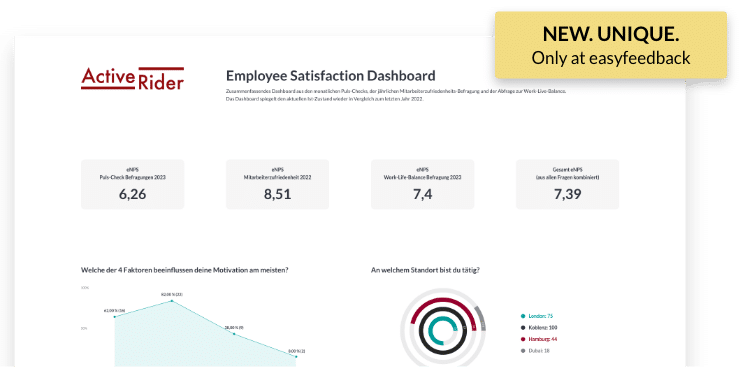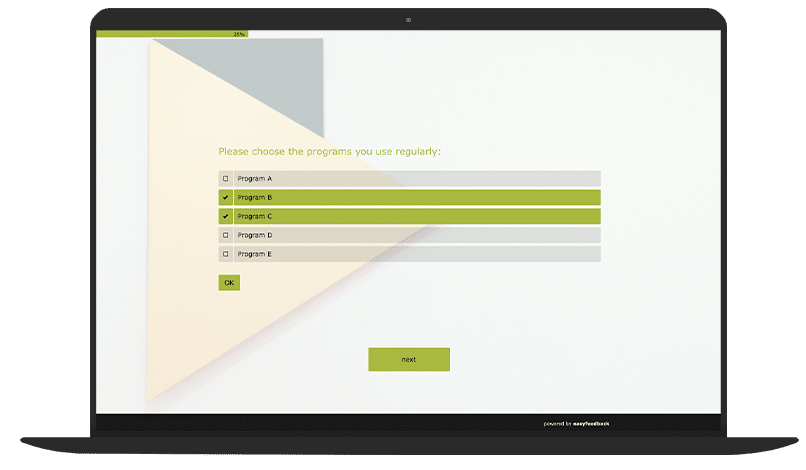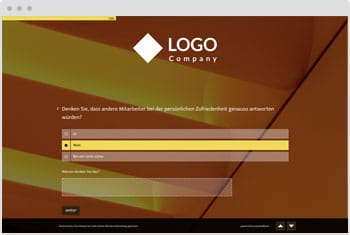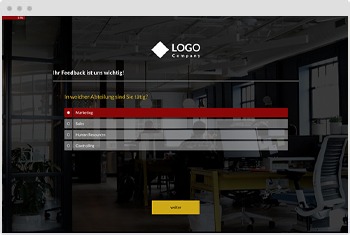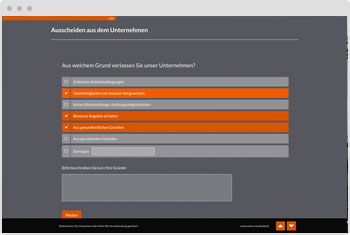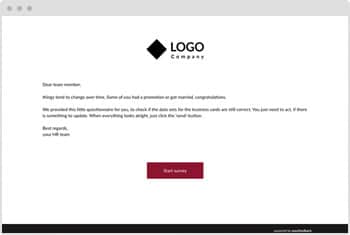Identify further training measures through regular surveys

With this ready-to-use survey template, you can determine the general need for further training measures and then carry out the planning of the measures in a structured manner.

“Identifying customer needs is an essential part of our business. easyfeedback accompanies us for many years as a loyal partner in this task. We particularly appreciate the intuitive usability of the survey tool as well as the professional support.”
Guild Lead User Experience Research

“We use easyfeedback for internal and external surveys – fast, comfortable and really easy! Straightforward and cordial support can always create a smile. We really appreciate the permanent development of the platform.”
Guest & Competitor Insights Analyst
Content and targets of this template
Increase the innovative power of your company through highly qualified employees. Regular further education and training ensure the future competitiveness of your company.
With regular employee surveys, you can easily determine which employees need which further training and education. Employees can then express their interest in the survey.
Identify which training courses are really needed. Plan your training measures in a targeted and cost-efficient way with our questionnaire.
Content:
• Identifying the training needs of employees
• Identifying interest for further training in the company
• Easily contact people interested in the training
• Identifying the software used and possible adaptation needs
• Develop training offers in a targeted manner
Targets:
• Planning the software used
• Determination of the real need for further training measures
• Effective further training in line with corporate goals
• Enable individual professional development

Data privacy protection „made in Germany“ (GDPR)

Anonymity functions for open feedback
Almost everything you need to know about further training measures
1. Why should I identify the training needs of my employees?
Identifying the training needs of your employees is important in order to maintain and increase performance potential in line with corporate objectives and thus remain competitive in the long term. Factors such as demographic change, many technical changes and new standards make lifelong learning necessary, even at work.
With regular employee surveys, you can easily determine who needs what training and development. Based on the results, you can, among other things, identify and eliminate possible weaknesses at an early stage.
For example, does an employee lack the knowledge to implement new standards? Or does he just about get his work done, but there is still potential for improvement? Or is only one employee proficient in a particular area, and as soon as he or she drops out, a bottleneck occurs? Or do employees need practical courses and more in-depth know-how in certain tools or technologies?
This is exactly where training measures come in, enabling your employees to deepen and broaden their existing knowledge and skills and to acquire new ones.
This increases the motivation of your employees, avoids fluctuations and increases the effectiveness of the company. In this way, you not only counteract a shortage of skilled workers, you also secure corporate competencies and thus competitive advantages on the market. In this respect, both sides benefit from an assessment of training needs: Employees and company.
2. How can I identify the need for training and development?
To determine the need for continuing education and training, it is first important to develop a concept of the areas in which training is needed. In order to avoid unnecessary training, it is essential that the needs analysis is carried out before recommending or approving further training and that you involve your employees. A needs analysis is always a target-performance comparison.
Possible starting points for a needs assessment could be:
- What competencies do employees already have? And which ones should they have in order to perform their tasks?
- Are there particular challenges that the company needs to address? Is there a need for training in this area?
- Which areas have lower turnover and can an increase in turnover or effectiveness be achieved through appropriate employee training?
- Which employees occupy important positions in the company and should be especially promoted or are required by law to receive further training?
- Should specific target groups be surveyed, such as managers, trainees, or employees in a team or department?
Once you have identified the potential areas, you can make use of various instruments. In the case of complex tasks or projects, it may be a good idea to hold a workshop with all those involved. In this way, the necessary further training requirements can be coordinated with all the employees concerned. Personal one-on-one meetings with employees or managers are also a good option.
However, in the daily work routine, there is often not enough time to talk to each employee about his or her personal development, so employee surveys have proven to be a good and cost-effective alternative.
If you want to find out about your employees’ training needs, our survey tool can help. Quickly and easily create your own training questionnaire or use our ready-made survey template to identify training needs.
3. What questions should I ask in the training needs questionnaire?
The aim of the survey is to determine the training needs of your employees and to derive possible measures from this.
The following sample questions can help you inquire about training needs:
- What competencies do you already have?
- What additional competencies would be useful to perform your tasks?
- Are there specific issues in your day-to-day work where you need support?
- Are you interested in further training opportunities?
- Is our training offering sufficient for you?
- In your opinion, is there a need for adaptation within your team?
You can find more possible questions in our survey template.
4. Who is responsible for the needs assessment of further training?
Responsibility for identifying the need for further training in the company lies with the managers. This includes the direct supervisors from the departments and the management. But the employees themselves are also actively called upon to contribute to the process, since they usually know best what knowledge and skills they lack in order to perform their jobs optimally.
For the needs assessment itself, appropriate methods and tools must be introduced and their use controlled. With the help of the tools, managers determine which employees have a need for qualification and decide which measures should be initiated. This also includes deciding whether training can be implemented internally or whether it makes sense to use an external provider.
5. How often should further training take place?
There is no one-size-fits-all answer to this question, because the need for training depends on a variety of factors.
For example, if the employee works in a technical area that is subject to constant innovation, he or she will probably need regular training to keep up to date.
In other areas, training may be needed only sporadically, for example, when regulations change. For certain professions (for example, insurance consultants, real estate agents, civil servants, teachers) or functions (for example, safety officers or first responders), there is even a legal requirement for continuing education.
As an employer or employee in the area of personnel development, you are naturally interested in ensuring that your employees have as comprehensive a level of knowledge as possible. Nevertheless, you should choose training courses carefully. An annual blanket training for all employees is usually not very effective, even if it is carried out regularly. Always pay attention to the personal requirements of each employee’s job. The rule here is quality over quantity.
You are in professional company







easyfeedback welcomes more than 740.000 participants per month!
